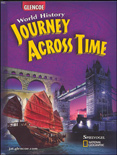World History: Journey Across TimeChapter 22:
Building Today's WorldWeb Activity Lesson PlansIntroduction
As students learned in this chapter, Africa faced problems after European nations divided it into colonies during the 1800s. Rival ethnic and religious groups started wars. Many people died as a result, and others were forced to become refugees. One of Africa's challenges was apartheid. Nelson Mandela and other anti-Apartheid leaders struggled for change, and in the late 1980s, the white-run government began to end apartheid. Visit the Web site The Long Walk of Nelson Mandela to learn more about the African leader who worked to end apartheid. Destination Title:The Long Walk of Nelson Mandela Lesson Description
Students will research the history of Nelson Mandela beginning with his road to revolution. They will read excerpts from Mandela's memoirs and see the effect apartheid had on the leader at The Long Walk of Nelson Mandela. After reading about the anti-Apartheid leader, students will be asked to answer four questions. They will apply their knowledge in a brief essay, comparing Mandela's revolution to modern- day issues they can relate to. Instructional Objectives - Students will examine the rules that apartheid imposed on African people and how the government persecuted those who opposed them.
- Students will research modern issues and evaluate historical events that could incite a new revolution.
Student Web Activity Answers - Umkhonto we Sizwe (The Spear of the Nation) was the name of the organization Nelson Mandela was charged to lead.
- Nelson Mandela began his revolution by reading and talking to experts. He also read literature on guerrilla warfare and on revolutionary leaders who used it to begin their own revolution.
- The letter Mandela sent on Freedom Day commended African people for their courage during the recent stay-at-home. It also called for a national constitutional convention.
- The National Action Council encouraged Nelson Mandela not to surrender after warrants for his arrest were issued.
- Historical revolutions students might use in their arguments include the French Revolution, the U.S. Civil War, and many uprisings throughout the world. Answers should reflect thought on the struggles of the present day and specific historical events that propelled the need for revolution.
 | 
















